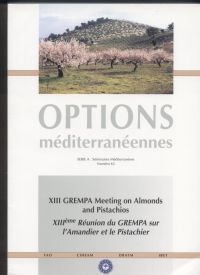| Article précédent | p. 341-346 | Article suivant |
Detection of polymorphic RAPD markers for Pistacia atlantica Desf.
Among the genus Pistacia, Pistacia atlantica Desf. is one of the important rootstock species. The RAPD technique is one of the powerful and useful molecular methodologies saving time and money in molecular characterization of plant genetic resources and germplasm. In this study, 76 RAPD primers were screened to find the most polymorphic RAPD primers to characterize P. atlantica germplasm and to apply them to future breeding programmes. All the primers produced amplification patterns. From the 76 primers tested, 1156 RAPD bands were produced and 800 of them were reproducible. Among them, 247 reproducible polymorphic bands were scored for an average of 3.25 scorable polymorphic bands per primer. One primer did not give polymorphic bands and the others amplified between 1 and 8 polymorphic markers, whose estimated sizes ranged from 150 to 2500 bp. Results of this study clearly indicated that RAPD markers are powerful tools for the detection of genetic diversity and germplasm characterization in P. atlantica.
- [ Afficher ]
- [ Télécharger ]
- [ Exporter la citation ]
Vous pouvez télécharger la citation au format :
- [ Imprimer ]
-
Mots-clés
PISTACIA ATLANTICA, POLYMORPHISME, RAPDCiter cet article
Kafkas S. Detection of polymorphic RAPD markers for Pistacia atlantica Desf.. In : Oliveira M.M. (ed.), Cordeiro V. (ed.). XIII GREMPA Meeting on Almonds and Pistachios . Zaragoza : CIHEAM, 2005. p. 341-346. (Options Méditerranéennes : Série A. Séminaires Méditerranéens; n. 63). 13. Meeting of the Mediterranean Research Group for Almond and Pistachio, 2003/06/01-05, Mirandela (Portugal). http://om.ciheam.org/om/pdf/a63/05600050.pdf



